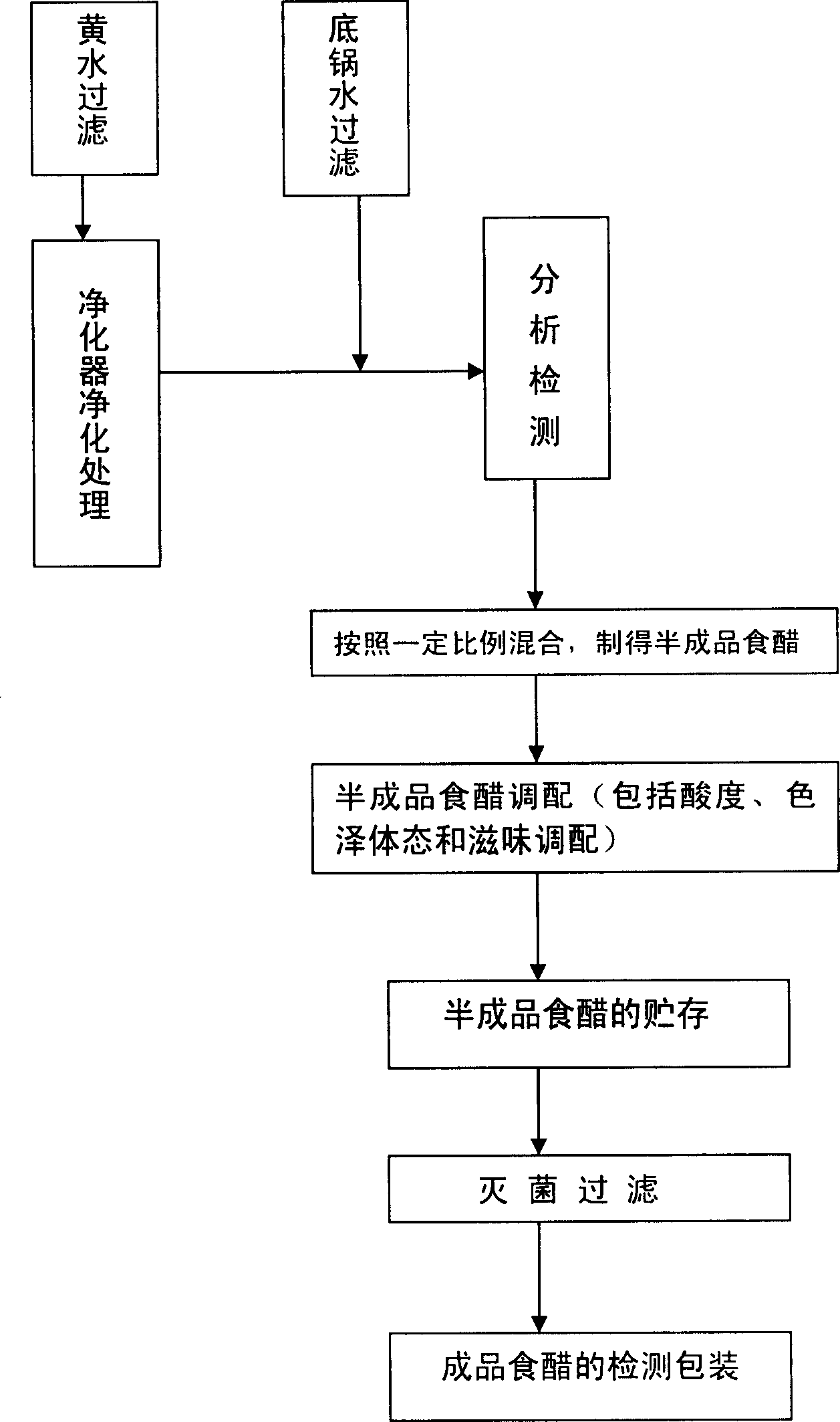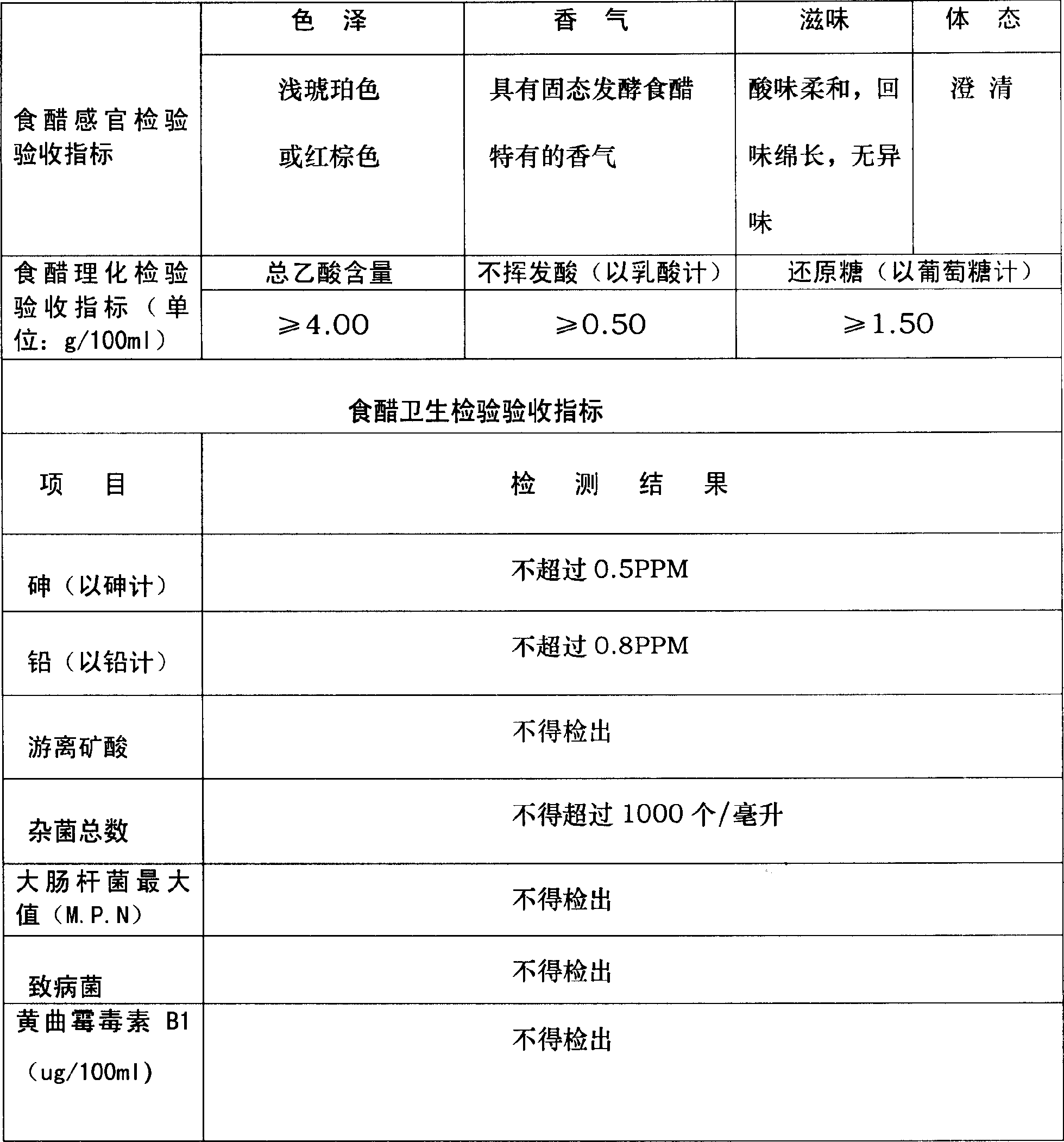Method for producing edible vinegar by using byproducts from solid fermentation production of distillate spirit
A method of white wine and by-products, applied in the field of vinegar production, can solve the problems of increasing sewage treatment cost, environmental pollution, waste of useful resources, etc., and achieve the effects of reducing production cost, comprehensive utilization, and mellow and soft sour taste.
- Summary
- Abstract
- Description
- Claims
- Application Information
AI Technical Summary
Problems solved by technology
Method used
Image
Examples
Embodiment 1
[0043] Raw materials:
[0044] 1. Fresh yellow water
[0045] It comes from the by-product of solid-state liquor brewing from Sichuan Tuopai Liquor Co., Ltd.; fresh yellow water with normal color, aroma and taste.
[0046] 2. Bottom pot water
[0047]It comes from the by-products produced by the solid-state liquor brewing of Sichuan Tuopai Qujiu Co., Ltd.; the bottom pot water is mixed according to the ratio of fresh yellow water and the wine tail in a ratio of 3:2, and then distilled to obtain the remaining distillation Bottom pot solution.
[0048] 3. The other auxiliary materials, glacial acetic acid, salt, and monosodium glutamate, are all commercially available products and have passed the test.
[0049] crafting process:
[0050] 1. Pretreatment of raw materials
[0051] The yellow water and the bottom pot water are respectively filtered with a filter cloth to clarify and have no suspended matter, and the filtered yellow water is purified with a purifier to remove peculiar s...
Embodiment 2
[0070] Raw materials:
[0071] 1. Fresh yellow water
[0072] It is a by-product of solid-state liquor brewing from Sichuan Tuopai Liquor Co., Ltd.; fresh yellow water with normal color, aroma and taste.
[0073] 2. Bottom pot water
[0074] The by-product from the solid-state liquor brewing of Sichuan Tuopai Liquor Co., Ltd. uses 100% fresh yellow water as distilled water to distill the distiller bottom pot solution left after the liquor.
[0075] 3. The other auxiliary materials, glacial acetic acid, salt, and monosodium glutamate are all commercially available products and have passed the test.
[0076] crafting process:
[0077] 1. Pretreatment of raw materials
[0078] The yellow water and bottom pot water are respectively filtered with a filter cloth to clarify and have no suspended matter, and the filtered yellow water is purified with a purifier to remove peculiar smells for use.
[0079] 2. Analysis and testing of raw materials
[0080] The yellow water and bottom pot wat...
Embodiment 3
[0097] Raw materials:
[0098] 1. Fresh yellow water
[0099] It comes from the by-product of solid-state liquor brewing from Sichuan Tuopai Liquor Co., Ltd.; fresh yellow water with normal color, aroma and taste.
[0100] 2. Bottom pot water
[0101] It comes from the by-product of solid-state liquor brewing from Sichuan Tuopai Liquor Co., Ltd., using 100% fresh yellow water as distilled water to distill the distiller bottom pot solution left after the liquor.
[0102] 3. The other auxiliary materials, glacial acetic acid, salt, and monosodium glutamate are all commercially available products and have passed the test.
[0103] crafting process:
[0104] 1. Pretreatment of raw materials
[0105] The yellow water and bottom pot water are respectively filtered with a filter cloth to clarify and have no suspended matter, and the filtered yellow water is purified with a purifier to remove peculiar smells for use.
[0106] 2. Analysis and testing of raw materials
[0107] The yellow wa...
PUM
 Login to View More
Login to View More Abstract
Description
Claims
Application Information
 Login to View More
Login to View More - R&D
- Intellectual Property
- Life Sciences
- Materials
- Tech Scout
- Unparalleled Data Quality
- Higher Quality Content
- 60% Fewer Hallucinations
Browse by: Latest US Patents, China's latest patents, Technical Efficacy Thesaurus, Application Domain, Technology Topic, Popular Technical Reports.
© 2025 PatSnap. All rights reserved.Legal|Privacy policy|Modern Slavery Act Transparency Statement|Sitemap|About US| Contact US: help@patsnap.com


